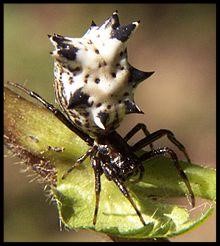
By Saundra McBreaty, outreach and volunteer services coordinator The forest is laced with tightly knit spider webs this time of summer, and I keep running face to face with the same peculiar orb weaver on my forested hikes. The Spined Micrathena is easy to identify because its abdomen is topped with odd, poking spikes. Armed with my handy field guide, Common Spiders of Ohio, published by the Ohio Department of Natural Resources, I learned that its hard, spiny abdomen protects it from becoming bird food. And although I keep running into this little spider’s sticky web, I need not to be concerned that she will bite me, she probably won’t.
So, instead of being creeped out when encountering the Spined Mircrathena, I am curious – particularly about the influences of Greek mythology reflected in the spider’s scientific name. There are numerous versions of the Greek myth surrounding Arachne versus Athena. Here are two versions of the story. Enjoy!
Myth version 1: Arachne, her name meaning spider in Greek, was a beautiful mortal woman with a great talent in weaving. Everyone was amazed at her work and one day, Arachne boasted that her talent was even better than the talent of the goddess Athena herself. This was an offense against the gods, which was a very serious – and even deadly – sin for the ancient Greeks. That is why goddess Athena transformed Arachne into a spider to weave for eternity.
Myth version 2: In this version, Zeus was the judge of the weaving contest between Arachne and Athena, and whoever lost would not be allowed to touch a spindle or the loom again. Athena won in this version, and Arachne was devastated that she could no longer weave. Out of pity, Athena transformed her into a spider, so she could continue weaving without having to break her oath.







